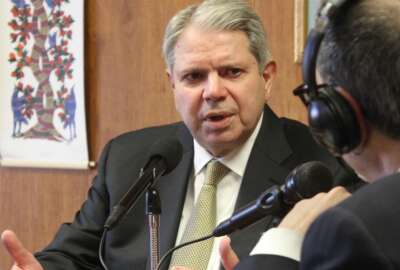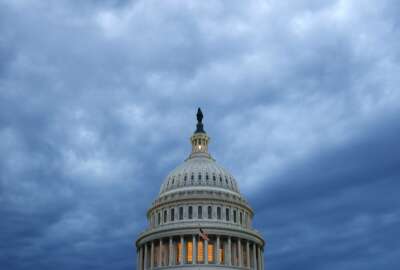
OPM’s dual role in talent acquisition poses ‘conflict of interest’
The House Oversight and Accountability Committee raised concerns over OPM's role as both regulator and provider of talent acquisition systems, saying the dual...
The Office of Personnel Management’s advantageous stake in the talent acquisition space is raising alarm bells in Congress.
As both regulator and provider of federal talent acquisition systems, OPM has an unfair advantage against other vendors, said Rep. James Comer (R-Ky.), chairman of the Oversight and Accountability Committee.
“OPM sells hiring-related services to those agencies which it oversees via USA Staffing, even though there are many private firms that assist both the private and public sector with hiring and related human capital acquisition activities,” Comer said in a March 22 letter to OPM, obtained by Federal News Network.
OPM’s USA Staffing is one of several options that federal agencies have for a talent acquisition system (TAS). The digital system lets candidates submit federal job applications. It also lets federal hiring managers track and assess applicants to open positions. Human resources specialists and job candidates also use TAS to electronically complete, review, sign and accept a variety of required forms to onboard new government hires.
Despite multiple TAS options on the table for agencies, OPM’s USA Staffing holds the vast majority of the federal marketplace. The system has 12,000 HR users and 114,000 hiring officials, and processes an average of 12,000 vacancies and 250,000 applications weekly.
While private sector TAS providers must comply with the full federal acquisition process, OPM does not have to. Because of its position within government, OPM can use the more straightforward and generally easier route of interagency agreements for onboarding agencies to use USA Staffing.
Unlike interagency agreements, the acquisition process is expensive and time-consuming. That’s pushing more vendors out of the market for TAS, limiting development of hiring software and creating a “loophole,” said one industry official, speaking on background.
“OPM is acquiring customers not through competition against the private sector, but just through interagency agreements, which don’t require market research, clear requirement publications, impartial evaluations or transparency in pricing and services,” the official said in an interview.
OPM’s additional position as the space’s regulator also makes for an uneven playing field, said Jeff Neal, former chief human capital officer at the Department of Homeland Security.
“That is what most people would consider to be an organizational conflict of interest, because OPM has a financial stake in what agencies are doing,” Neal said in an interview with Federal News Network. “They’ve also pushed a number of companies out of the federal space for talent acquisition software, because it’s very difficult to compete with OPM.”
“There hasn’t been a lot of innovation in that space in the government in a long time,” Neal, author of the blog ChiefHRO.com, added. “People in the private sector are not going to invest a lot of money in developing new, innovative or better products for the federal government, when they know they don’t have a level playing field to compete on.”
OPM did not immediately respond to a request for comment from Federal News Network.
OPM may have other benefits in this area, too. USA Staffing, Comer said in his letter, has an inherent advantage through access to OPM policy decisions and planned software updates in advance of TAS competitors.
“Private TAS providers do not have this advantage and are forced to implement updates immediately with no time to prepare,” Comer said.
Despite frustrations from private sector TAS vendors, maintaining a strong relationship with OPM is still essential, since the agency acts as the system’s regulator.
“We need a good relationship with OPM, because we need insight into the policies and the plans,” the industry official said. “We work really hard to maintain that relationship.”
On top of the disparities in the TAS market, Comer said he is additionally concerned with internal issues for USA Staffing — specifically, the system’s cybersecurity protections.
“We are concerned OPM may be subjecting federal staffing data to a sub-optimal cybersecurity environment,” Comer said, pointing to the findings of a 2022 OPM Inspector General report.
One area of acute concern for Comer was data protection, something that OPM has come under fire for in the past after a major data breach in 2015.
“OPM also received grades of ‘D’ and ‘F’ on the cyber-related section of the two most recent FITARA scorecards. Private sector TAS providers, however, are required to be FedRAMP certified, suggesting a higher level of cybersecurity maturity. USA Staffing should be held to the same stringent security requirements as its competitors,” Comer said in the letter.
The concerns from lawmakers are not new. Committee Democrats have also raised flags about USA Staffing in recent years.
Former Oversight Committee Chairwoman Carolyn Maloney (D-N.Y.), along with Comer, previously requested that the Government Accountability Office conduct a report on USA Staffing. Rep. Jamie Raskin (D-Md.), the committee’s current ranking member, has also joined the bipartisan pushback on OPM.
The upcoming GAO report will look into the extent that OPM’s processes and procedures help ensure the effective management of USA Staffing, how USA Staffing has supported selected agencies’ hiring needs and the extent that OPM has implemented an effective assessment of cybersecurity risk for USA Staffing, GAO’s Managing Director for Public Affairs Chuck Young said in an email to Federal News Network.
GAO is currently putting together the report, which will be available later this year, although there is not yet a specific date set for publication.
Oversight Committee Democrats said they will review GAO’s findings, and plan to take “any necessary actions” once the report is published, a Democrat committee spokesperson said.
The more recent letter from Comer “reinforces the Oversight Committee’s concerns,” a Republican committee spokesperson said.
OPM has not yet responded to Comer’s letter, the spokesperson said.
“If OPM continues to use USA Staffing, it should be on a level playing field with other hiring services providers from the private sector,” Comer said.
Copyright © 2025 Federal News Network. All rights reserved. This website is not intended for users located within the European Economic Area.
Drew Friedman is a workforce, pay and benefits reporter for Federal News Network.
Follow @dfriedmanWFED





